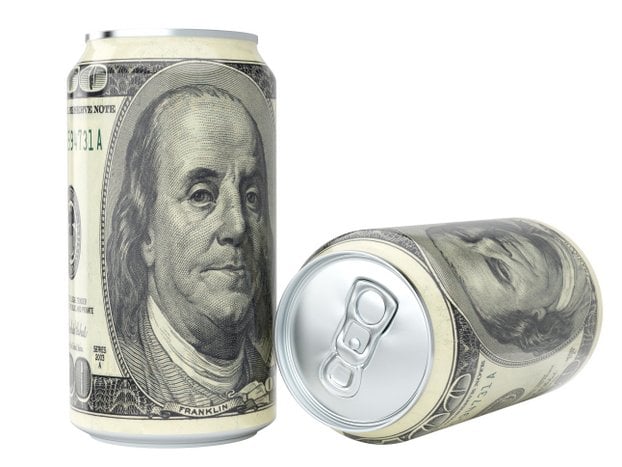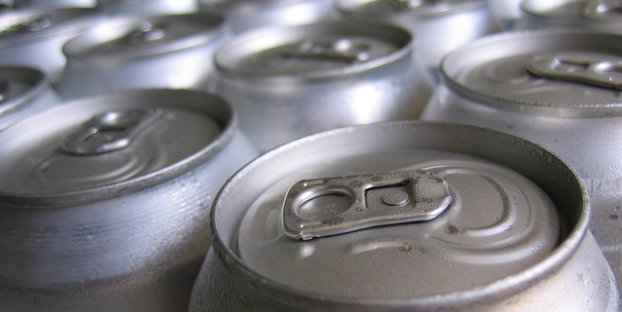 In June, MillerCoors estimated premiums on aluminum could cost the company $40 million. That feels like an unacceptable number, but the American trade war continues with aluminum and aluminum cans becoming a battleground commodity. The Beer Institute, a trade association representing the beer industry, has been hammering the issue — specifically the Trump administration’s imposed 10 percent tariff on all foreign aluminum — I highly suggest you read the organization’s extensive blogs on the subject. According to the BI, brewers fill and sell about 36 billion aluminum cans and bottles per year. These vessels hold 62 percent of the beer volume made and sold in the United States. And while these aluminum cans and bottles are manufactured here in the United States, about 36 percent of the aluminum is imported and about 64 percent is sourced domestically.
In June, MillerCoors estimated premiums on aluminum could cost the company $40 million. That feels like an unacceptable number, but the American trade war continues with aluminum and aluminum cans becoming a battleground commodity. The Beer Institute, a trade association representing the beer industry, has been hammering the issue — specifically the Trump administration’s imposed 10 percent tariff on all foreign aluminum — I highly suggest you read the organization’s extensive blogs on the subject. According to the BI, brewers fill and sell about 36 billion aluminum cans and bottles per year. These vessels hold 62 percent of the beer volume made and sold in the United States. And while these aluminum cans and bottles are manufactured here in the United States, about 36 percent of the aluminum is imported and about 64 percent is sourced domestically.
The end result of this aluminium tariff, as everyone has been predicting, is that can prices are going up and in some places there are can shortages. WRAL.com, covering news in Raleigh, N.C., just ran a report on Trophy Brewing Co., which is paying more for its cans now.
“Cans usually cost about 9.5 cents each, but we’re currently paying a half penny more than that,” said Les Stewart with Trophy Brewing.
Stewart said the half penny ends up costing plenty – as there are 8,169 cans per pallet.
“It’s about $40 a pallet (extra),” he said. “We run through about three pallets a week, so about $150 a week, and that’s just cans.”
This video report from KPBS (PBS and NPR for San Diego) talks about San Diego craft breweries and national can manufacturers struggling to understand the tariff. Mike Hess from Mike Hess Brewing Co. cites a cent and half increase per can from Crown. His brewery processes some 3 million cans per year, and the extra cost ends up being $44,000 a year just for the packaging. Most brewers are noting that this increase isn’t being passed along to consumers, so it’s an extra cost breweries are eating.
Canadian breweries are finding higher prices and more difficulty finding actual beer cans. Canada imposed retaliatory tariffs on July 1 in response to the U.S.’s duties on aluminum. A lot of beer cans are made by big aluminum and packaging corporations like Ball and Crown in America and exported to Canada. The trade war is causing supply chain disruptions and bigger costs per can up north too as Canadian brewers are essentially double-tariffed (the aluminum was imported into America from Canada with a tariff attached, and then cans were exported back to Canada with an additional tariff attached). According to the Calgary Herald:
Andrew Kulynych of Bench Creek Brewing in Edson, Alta., said his supplier, West Coast Canning, has already raised prices 10 per cent to reflect increased import costs. He said he bought $100,000 worth of cans last year, so is expecting to pay $10,000 more for the product in 2018.
That’s a lot of dough, but to put this all in perspective, the Trump administration has cut a lot of taxes for brewers in general. President Trump signed the Tax Cuts and Jobs Act into law on Dec. 22, 2017. Despite the controversy surrounding it, the alcohol industry is an enormous winner with these new laws because on top of the corporate tax reduction (now a flat 21 percent) the bill includes a version of the Craft Beverage Modernization and Tax Reform Act, which provides mass excise tax relief for the calendar years 2018 and 2019.
Brewers that produce less than 2 million barrels annually will be taxed at a rate of $3.50 per barrel on the first 60,000 barrels of beer produced and $16 per barrel on any further barrels produced up to 6 million barrels (with more than 6 million barrels, the excise tax remains $18 per barrel). Beyond the Craft Beverage Modernization and Tax Reform Act, there are other goodies in the Tax Cuts and Jobs Act that brewers can cheer about — like the new deduction for pass-through entities — which is a business structure used to reduce the effects of double taxation.
Still, from the brewer’s perspective, an extra cost for aluminum cans is just a needless expense dropped in out of nowhere. Expect beer associations like the BI and both big and small brewers alike to make aluminum tariffs a top legislative issue until the borders get reopened for free trade.




Leave a Reply
You must be logged in to post a comment.